This week our Raider/Contributor skates back to the 70’s to that highest of high times for that uber-niche genre of Roller Derby films. Whether you just barely remember Rollerball (the original) or your obsessed with Unholy Rollers, or you are more of a Roller Derby Modernist and rely on Rollerball (the remake) and Whip It, you must acknowledge that the Godmother of them all is Kansas City Bomber. But did you know that KC was actually happiest Portland? Raider/Contributor Phil Oppenheim takes us under the laces and beneath the helmet(less)s of the 1972 Raquel Welch classic…
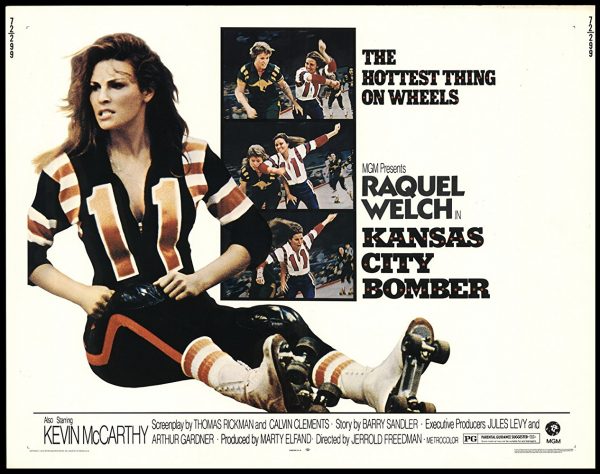
In 1972, the hottest thing on wheels wasn’t Richard Petty, Evel Knievel, or even the Dodge Charger: it was, as MGM’s PR department helpfully informed movie fans, Raquel Welch. Marrying the wild, violent antics of roller derby to Welch’s incendiary sex appeal was too high a concept not to fall for (or for the executives at MGM, whose legendary golden years were a few decades in the rear-view mirror, not to desperately clutch at). Helen Reddy’s hit single “I Am Woman” became a pop-feminist anthem in May of 1972; MGM was hoping that Raquel in roller skates might also give women something to roar about (and men something to roar for too).
While it would be misleading to suggest that Kansas City Bomber is a ‘70s “feminist” film — there are far too many scenes of female bodies (in typically exploitative locales like locker rooms, showers, and dance floors) offered up for the male viewer’s leering gaze to make that leap — the film does have its moments of raised consciousness, making it more interesting than you might expect, and more than just an easily dismissed product of its times. In fact, you might want be tempted to file it alongside quasi-feministploitation flicks like Coffy, Friday Foster, Cleopatra Jones, and Ms. 45 in your trash film collection (and if you don’t have a trash film collection — yes, I’m shaming you into starting one).
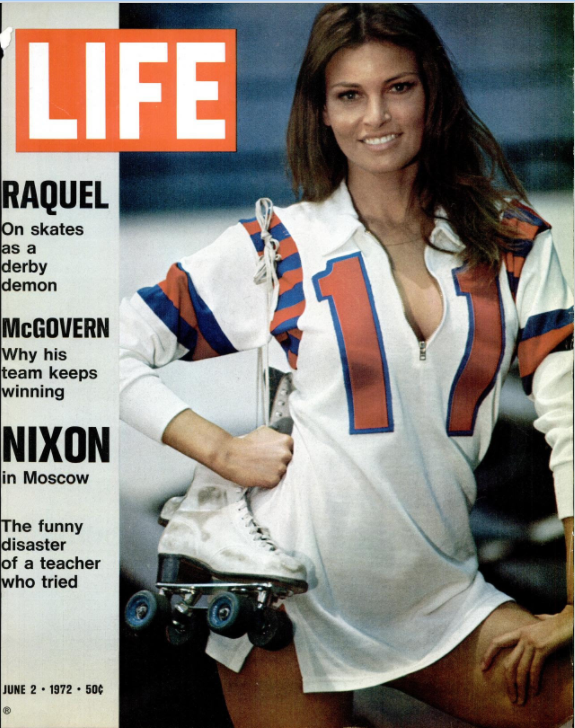

Raquel Welch plays aspiring derby sensation KC, a star-in-the-making who moves to Portland early in the film, eager to become the dominant player of the local scene. But while KC tries to be a strong, self-determined woman, her world often works against her. She’s a single mom who leaves her kids at home to be cared for by her mother so that she can pursue her dreams of self-actualization via roller derby stardom, opening herself to both maternal withering criticism and charges of parental neglect . KC explains her decision to skate her way to personal fulfillment, “Mom, I was dying here,” anticipating Brutal Beauty’s skaters’ motto of “Roller Derby Saved My Life” some 40 years later. In turn, when her mother tries guilt-tripping her into marrying some rich doofus and settling in to her small home-town, she counters the browbeating with a declaration of rebellion: “I just want a little piece of the action, so I don’t have to apologize every time I turn around. That’s all.” KC wants to grab her own trophy, not wind up as some banker’s arm-candy trophy wife.
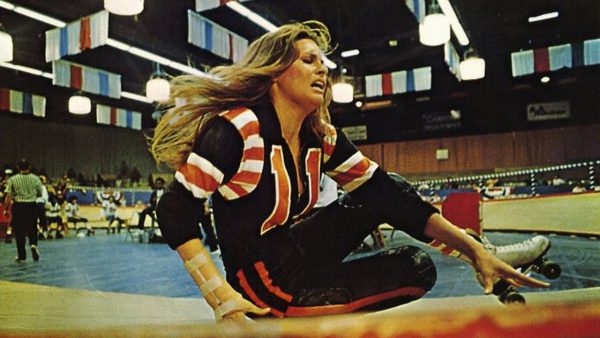

KC brawls with other women on the track on her way to derby glory, but her battles continue after she unlaces her skates; off the track, though, she dodges and battles the unwelcome attention of Men. KC meets with a constant barrage of aggressively male harassment, with often-violent sexual threats around every corner. After she and a friend beat up a handful of drunken fans who paw and grope them, she heads out to a derby-skater hangout bar (Portland’s World Famous Kenton Club!) — only to be forced to fight off the advances of yet another creep, a fellow skater. After she rebuffs his advances, after which he continues to get handsy, KC threatens him: “If you don’t cut that out, I’m gonna give you something where you can feel it.” When he finally leaves the bar, the other women in KC’s circle unsympathetically laugh and joke: “You hear what happened to Randy? Nothing!” In Kansas City Bomber’s world, sexual violence and harassment aren’t shocking events, but the norm, little more than a punch-line of a bar-joke.
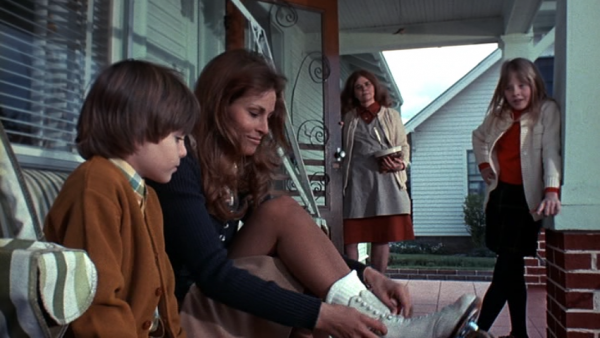

What makes Kansas City Bomber especially unsettling, though, is the way Raquel Welch’s star persona complicates reading it as a simple feminist-flavored parable of empowerment. Welch was one of Hollywood’s all-time most famous sex symbols, her name alone conjuring up images of fur-bikini-clad buxomness and feminine spectacle intended to engorge heterosexual male desire (from One Million Years B.C. to Myra Breckenridge and beyond). In Kansas City Bomber, her tight sweaters and zipper-straining uniforms conspire to make it impossible to look away from her; while she subverts her sex-kitten image on the track (fighting, shoving, shouting into microphones like a professional wrestler), she embraces her hyper-femininity when her skates come off, purring softly and overly politely to her much-older boss (slimily played by white-haired Kevin McCarthy) and “allowing” him to seduce her (in several cringe-producing scenes). Is KC complicit in her own objectification as a sex toy, allowing herself to become the aging combover-corporatist’s shapely trophy?
Maybe, though I prefer to read the movie a little differently: I think Kansas City Bomber forces the viewer to address its own complicity in the machinery of exploitation, objectification, and violence. The film raises all of these questions by inviting us to both ogle Raquel Welch and feel guilty (if not responsible) for her harassment, ultimately lighting the fuse on a sex-bomb and letting it explode in our brains.
Not a bad for a little roller derby flick, huh?
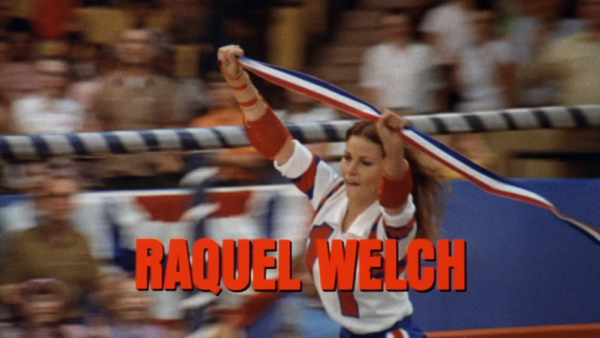

Even if you’re not in the mood to watch a movie that makes you feel guilty for enjoying it — which is the perverse pleasure of digging exploitation films in the first place, I’d argue — there are other great reasons to check it out. Want to see roller derby action before it became all sanitized in its most recent, post-woke iteration? The women in Kansas City Bomber kick, punch, scratch, punch, pull hair, and stomp each other in the face with their skates (!). And only the jammers wear helmets (so that the rest of the team can easily identify them to pile on top of them). Tired of gentrified hipster fans with armloads of kids in cute team t-shirts applauding politely at the matches?
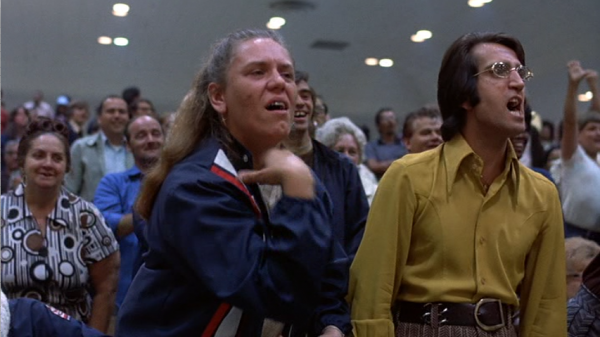

Portland’s ringside fans in Kansas City Bomber are a bloodthirsty lot, screaming obscenities (often toothlessly), laughing at illegal body blows, and throwing trash at their least favorite skaters. The unruly, unsophisticated mob — from the yelling old ladies to the guffawing working stiffs in overalls — capture the best reason for this Archive Raid: this movie captures Old Portland long before it popped onto the New York Times’s radar as the Most Livable Anything. There are plenty of mullets, droopy mustaches, and high-waisted mom jeans in the Portland crowd scenes, but no one is wearing carefully curated ringer t-shirts, chunky glasses, high-waisted mom jeans, or fleece-lined corduroy jackets ironically. This is the real-deal Portland, the people living in and around North Portland’s Columbia River houseboats and (former) Multnomah County Exposition Center having little idea that their city would be transformed into a caricature of a new, twee “Portlandia” in just a few decades. Try and put a bird on that!
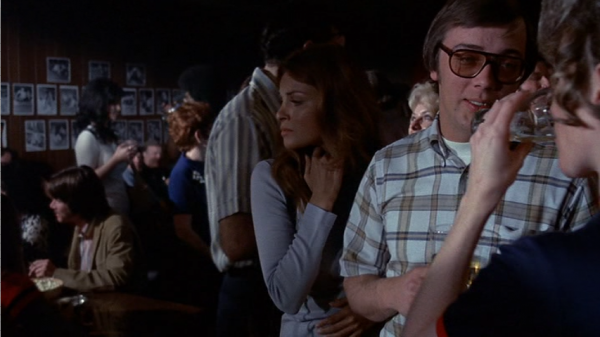

Watch: The best Kansas City Bomber experience would be if you could watch it at a drive-in, or projected on a blank wall of a roller rink (note to Oaks Park: give me a call!). Barring that, you can stream it at the usual suspects; I rented mine from Movie Madness.
Listen: Jeff Thomas sings Don Ellis’s slightly groovy but thematically appropriate “Your Way Ain’t My Way,” which you can hear a couple of times in the film. For a real revelation, though, check out Phil Ochs’s shot at a theme song, a rare slice of late-period work from the legendary folkie. If you’ve ever wondered what one of the most powerful voices of ‘60s rebellion sounded like picking up a paycheck, look no further. H/T YouTube.
Show your support: Salem’s Cherry City Roller Derby League’s Battle of the Stars is Saturday, January 27. It’s going to be a battle between Star Wars and Star Trek — so why are you reading this instead of trying to score tickets. Roll, Lt Uhura, ROLL!
Visit: Raquel Welch made The World Famous Kenton Club World Famous, but the dive bar’s been open in North Portland since 1947. There’s no roller derby to be had, but there is cribbage (every other Tuesday); on weekends, stop in for a great boozy brunch.
- Written by Phil Oppenheim

